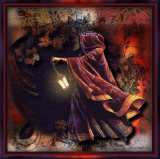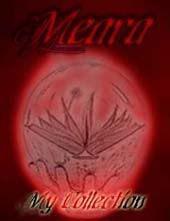Witches' Brew at Winter Solstice
How Wiccans do themselves in.By Mark Oppenheimer
Posted Wednesday, Dec. 21, 2005, at 7:15 AM ET
If, as linguists say, a language is just a dialect with an army, then
a religion is just a madman's fantasy that has failed to die out.
Religions gain legitimacy by lasting, and by that measure Wicca is
well on its way to being mainstream. Now 50 years old, the earth-
centered faith (also known as paganism or witchcraft) has thousands
of adherents and many more occasional dabblers in the United States
and Europe. Dozens of new Wicca books are published every year. There
are dozens of Wicca conferences and retreats. And solstice
celebrations are now seen as normal in the United States—and in
freethinking Unitarian churches, practically required.
But Wiccan teachings are for the most part a stew of demonstrably
false historical claims. There's no better time to examine this
penchant for dissembling than at winter solstice on Dec. 21, which
Wiccans say has been their holiday for thousands of years. For it's
just such unfounded claims to old age and continuous tradition that
may keep Wicca from growing to be truly old.
Wicca is not a unified movement; it comprises "good" witches who use
spells and charms, feminist worshippers of a monotheistic Goddess,
and earth-cultists who propound nature worship. But the many strands
overlap. They're gynocentric; they're all concerned with nature; they
all celebrate eight holidays, or "sabbats," that include the
equinoxes and the solstices. Adherents typically say that those eight
holidays were celebrated by ancient Wiccans or pagans, primarily
Celtics or Romans, whose traditions the contemporary Wiccans are
carrying on. These seasonal festivals, they add, have been co-opted
by Christians, who turned Samhain into Halloween and Yule into
Christmas.
The rare Wiccan belief that pans out is that Christmas is an
adaptation of a solstice celebration. We have no way of knowing when
Jesus was born. Scholars generally agree that by the late fourth
century his birthday was figured for Dec. 25, because that was
already the day of the Roman feast of Sol Invictus (the "undefeatable
sun"), a solstice holiday, as well as the time of Saturnalia, the
festival for Saturn.
But in reaching for a usable past, Wiccans trumpet numerous other
historical claims that are entirely without merit. The central claim
that Wicca is descended from pre-Christian cultures and that it was
driven underground by violent Christians was popularized by the
writer Starhawk, whose 1979 book The Spiral Dance: A Rebirth of the
Ancient Religion of the Great Goddess is a foundational text for
contemporary Wiccans. Starhawk based her teachings on the work of,
among others, Marija Gimbutas, a UCLA anthropologist who in the 1970s
and 1980s argued that in pre-Christian times there existed a unified,
female-centered, Indo-European society that worshipped a Goddess.
Recent scholars, however, have shown that there was no prehistoric
Goddess-centered matriarchy. They've also concluded that the Celts
probably did not celebrate eight seasonal sabbats, and, alas, that
contemporary Wicca was invented in the 1950s by Gerald Gardner, an
English civil servant with a deep interest in the 19th-century
occult. One can read the brutal truth about all of these debunked
theories in a fine article by Charlotte Allen in the Atlantic Monthly
(available to subscribers only) and in The Myth of Matriarchal
Prehistory, a superb book by Cynthia Eller.
Wiccans heaped scorn on Eller, attacking her book as an unforgivable
act of anti-Wiccan bigotry, even female self-loathing. By marshalling
evidence against so much of the Wiccans' claimed history, Eller was
hitting a young religion where it hurts. Certain Wiccan claims had
seemed plausible, not to mention appealing—my sister's high school
uses a textbook that teaches this myth of a prehistoric woman-
centered culture. So, adherents had based their faith on what they
considered a verifiable back story. Wiccans had believed, and built
their faith around, shoddy feminist scholarship that had itself
become an article of absolute belief. Faced with Eller, Wiccans could
have taken an honestly religious position—"We have faith, Cynthia,
and your facts can't shake it." Instead, they attacked her.
And therein lies the problem for Wiccans: Religions tend to succeed
to the extent that they are not subject to tests of proof. They are
based on beliefs in invisible deities and on mystical experiences
that can't be explained by one person to another but must be
experienced for oneself. So, the more obscured by time or erosion a
religion's possible proofs are, the more freely the religion can
succeed as a matter of faith. Mormonism could never flourish so long
as Joseph Smith could be interrogated, face to face, about his
visions. He needed to become a mythic—that is to say, long dead—
figure. Jews should pray that we never find the Ark of the Covenant;
the truth of a religious system should not be subjected to carbon-
dating the tablets.
So long as Wiccans are hung up on whether Christmas is derived from
old solstice rites (it is) or whether Christendom murdered 9 million
alleged witches from the 14th to the 18th centuries (not even close),
the religion will seem a little absurd. It's one thing to have faith
in things unseen; that's human. It's a whole other thing to have
faith in an easily disproved historical conceit.
There's evidence that many Wiccans may be wising up. Starhawk has
backed off her boldest assertions and now concedes that some part of
her original historical matrix may not be true. The debatable notion
that Hanukkah is also based on solstice celebrations has been floated
but has not caught on, even among diehard Goddess worshippers. Both
Starhawk and Carol Christ, another prominent Goddess evangelizer,
told me they had no reason to believe the Hanukkah theory. Chastened
by the attacks on their bad historiography, Wiccans are growing more
likely to say that their faith is based on a love of Wiccan
practices, rather than on particular historical claims. It's a
heartening development when religious belief isn't dependent on the
latest archaeological findings. Wiccans might no longer have to
sacrifice intellectual rigor to get their spiritual sustenance.
---------------------------------------||---------------------------------------



